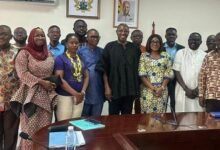Develop local seed industry—PFJ Report

A report on the Planting for Food and Jobs Programme has recommended to government to stop importing certified seeds for planting and focus on developing seeds locally to improve yields.
It stated that a change in approach would encourage local farmers to specialise in seed production as their main agricultural venture and further enhance seed sovereignty of smallholder farmers.
In this regard, it proposed to the government to invest in research institutions including the Crop Research Institute to develop improved seeds that are adapted to the country’s climate conditions and could withstand unfavourable situations.
The report, which was put together by Caritas Ghana, a charity organisation of the Ghana Catholic Bishops’ Conference, was to assess the contribution of the programme to the realisation of Sustainable Development Goal (SDG) 2 as well as the Agenda 2030 principle of “Ensure no one is left behind.”
In pursuit of the SDG and uphold the principle, the report noted that there was the need for special targeting of vulnerable groups including women and youth to help them overcome any entry barriers and take advantage of opportunities in the programme.
In addition to promoting agro-industries to absorb excess farm produce as a result of the programme, it also called for use of locally produced food in the implementation of the school feeding programme and feeding of Senior High School students.
To promote sustainable agricultural production systems, the report also indicated the need for the government to engage research to combine chemical fertilisers with organic fertilisers especially in Savannah areas.
The report, however, identified late supply of farming inputs like fertilisers and seeds to farmers as a challenge which could undermine the effectiveness of the programme, and called for timely budget release and continuous engagement with suppliers to deliver required inputs on time.
Discussing the report yesterday in Accra, Samuel Zan Akologo, Executive Secretary of Caritas Ghana, said the programme was found to be responding to some of the priority concerns of small holder farmers and was on track towards achieving the intended objectives.
He, however, noted that the programme was yet to consciously promote sustainable agricultural practices as envisaged under SDG and fails to target the weak and vulnerable in the various communities.
Mr Akologo called for the disaggregation of data to ensure that vulnerable groups were identified and targeted with some interventions to carry them along in the development process to promote inclusiveness.
Technical Advisor to the Minister of Planning, Dr Kodjo Mensah-Abrampah, said the government was pursuing the SDGs through its coordinated programme that focused on growth and job creation.
The Government, he said, was designing strategies to deal with challenges that impeded vulnerable groups from taking advantage of the programme.
For the programme to be a success, Dr Mensah-Abrampah called on Civil Society groups to continue to serve as a watchdog and make critical inputs in plans to promote sustainable agriculture.
BY CLAUDE NYARKO ADAMS and DOROTHY BROCKE






